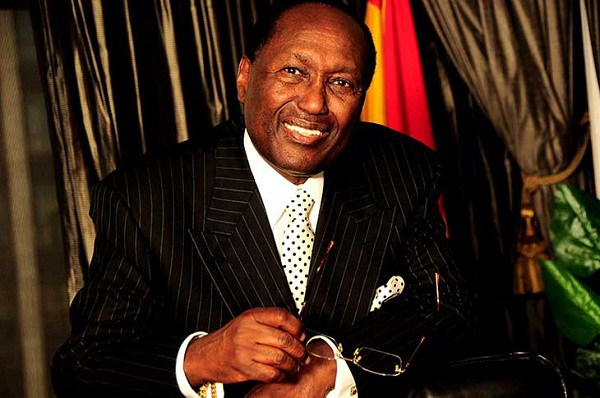Businessman Chris Kirubi and a group of institutional investors pocketed a Sh11.7 billion profit from last year’s sale of a 60.7 per cent stake in UAP Holdings to Old Mutual Group, making it one of the most lucrative transactions in corporate Kenya’s history.
London-based Old Mutual says in its latest annual report that it paid Mr Kirubi, Centum Investment Company and private equity firms Africinvest, Abraaj and Swedfund £152 million (Sh20.4 billion) representing a 134 per cent premium on UAP’s net assets.
“The (total) value of UAP, £257 million (Sh34.6 billion), is greater than the fair value of the net assets acquired and resulted in goodwill of £150 million (Sh20.2 billion) being recorded in the statement of financial position of the group,” Old Mutual says.
Old Mutual says its share of UAP’s net assets stood at £64.9 million (Sh8.7 billion) at the end of last year, revealing the huge premium it paid for control of UAP’s assets and future earnings.
For Mr Kirubi and the institutional investors, the payout is even larger than the Sh11.7 billion in light of the fact that they were paid dividends for the transaction year and had invested lesser amounts than their share of UAP’s net assets as of December 2015.
The Sh20.2 billion goodwill – representing the premium paid on UAP’s net assets — is split into the additional Sh11.7 billion paid to the Kirubi group and Sh8.5 billion attributable to continuing minority interests in the insurer.
The disclosures reveal the confidence Old Mutual had in UAP’s future prospects, prompting it to pay a significant premium on the insurer’s share price that had rallied to a high of Sh140 on the over-the-counter (OTC) market. Old Mutual, for instance, valued UAP’s brand at £17 million (Sh2.2 billion) and its customer relationships at £3 million (Sh404 million).
Mr Kirubi’s 9.58 per cent stake in UAP, which would ordinarily have had a fair value of Sh1.3 billion as of December, was sold for Sh3.2 billion in February last year, earning him a profit of Sh1.8 billion.
Single-largest shareholder
Centum, where Mr Kirubi is the single-largest shareholder, held a 13.75 per cent interest in UAP with a fair value of Sh1.9 billion but the investment firm sold the stake for Sh4.6 billion in the February 2015 deal, earning it a profit of Sh2.6 billion.
The PE firms on the other hand sold their combined 37.33 per cent equity for Sh12.5 billion in June last year, earning a profit of Sh7.2 billion from a stake whose fair value stood at Sh5.3 billion at the close of the year.
The investors’ earnings are much larger when viewed from the standpoint of the investment each of the parties made in the insurance firm.
The PE firms, for instance, invested Sh4.6 billion in UAP in 2012 by advancing a convertible, interest-earning loan at an annual rate of five per cent. They then converted the debt to equity in the same year, taking significant stakes that they sold to Old Mutual at more than double the investment.
Mr Kirubi and Centum earned even better returns, having invested in UAP years before the entry of the PE funds. UAP’s stock was quoted at a new high of Sh180 – nearly matching the Kirubi group’s buyout price — in February this year, indicating significant capital gains for the minority continuing shareholders.
Businessman Joseph Wanjui, a founder of UAP, remained as the company’s single-largest individual shareholder with a 20.46 per cent stake through his investment vehicle Bawan Limited. James Muguiyi, former chief executive of UAP, has a 5.97 per cent stake while William Kimutai has a 1.65 per cent stake.
Andrew Smith has a 0.85 per cent interest in the firm, ahead of hundreds of other individual investors that own a combined 10.41 per cent stake.
While Old Mutual was bullish about UAP’s future prospects, the multinational has seen lower-than-expected returns from the investment so far.
Old Mutual says UAP’s adjusted operating profit, after-tax and excluding transaction costs, stood at £2 million (Sh269 million) last year.
This represented an annualised return on invested capital of 2.5 per cent, ranking the lowest among the four major acquisitions completed by Old Mutual in the nine months ended June 2015.
“Whilst we recognise that returns from acquisitions take some time to come through, this is well below our target range of 12 per cent to 15 per cent, and each business is focused on ensuring that appropriate returns are delivered,” Old Mutual says.
“Each relevant business is now focused on ensuring that the return on invested capital matches the business case for their acquisition and can contribute to enhancing the return on equity (ROE) of the wider business as the growth potential materialises.”
The multinational added that the merger of UAP and its other local subsidiaries is progressing well despite the complexity of implementing the business consolidation. The merged UAP/Old Mutual business is expected to be listed on the Nairobi Securities Exchange (NSE) but no firm timelines have been given.
Listing the company is expected to give it an easier path to raising new capital while providing liquidity to investors seeking to exit.
Reporting in the local currency and as an independent business, UAP said its net profit fell 46.2 per cent to Sh896.6 million in the year ended December.
This came as investment income declined by Sh1.3 billion, largely as a result of fair value losses in its portfolio, including equities.









